PAGE 4
Matterhorn: A Novel of the Vietnam War by Karl Marlantes
Missions of Fire and Mercy: Until Death Do Us Part by William Peterson
Nam Sense: Surviving Vietnam with the 101st Airborne Division by Arthur Wiknik, Jr.
Never Forget by Andy Adkins
Not to Reason Why by Robert Decker
No Where Manby Stephen Piotrowski
Nu by James J. Flannery
… Of Bags, Counts and Nightmares by Ron Marks
One Month, 20 Days, and a Wake Up by Chuck Jackson
One More Sunrise by Curtis P. Gay
Our Sons, Our Heroes: Memories Shared by America’s Gold Star Mothers from the Vietnam War by Linda Jenkin Costanzo
Our Turn to Serve : An Army Veteran’s Memoir of the Vietnam War by David B. Simmons
Please Write: A Novel by Janette Byron Stone
Point: Wilderness War in Vietnam and Cambodia – A Memoir by Jamie Thompson
Poisoned Jungle by James Ballard
Prairie Fire by Kent White
Prey for the Sniper by David Allin
Pucker Factor 10: Memoir of A U.S. Army Helicopter Pilot in Vietnam by James Joyce
Rat Six by Jack Flowers
Recondo: LRRPs in the 101st Airborne Kindle Edition by Larry Chambers
Rice Paddy Stew and Saigon Tea by Kerry (Doc) Pardue
River Rats by Ralph Christopher
Rolling Thunder by Mark Berent
Rendezvous by Nelson DeMille
Rucksack Grunt by Robert Kuhn
The Road to Vietnam by Robert F. Quinn
 Matterhorn: A Novel of the Vietnam War
Matterhorn: A Novel of the Vietnam War
by Karl Marlantes![]() Matterhorn, August 4, 2010
Matterhorn, August 4, 2010
Karl did a wonderful job in writing Matterhorn. As a Vietnam infantry vet myself, it was easy for me to relate to many of the hardships experienced by the Marines in this story. I also remember those constant never-ending humps through the jungle – at times for days on end and sometimes without sufficient food or water. The story moved easily and I found myself reading way late into the night because I wasn’t able to put my Kindle down. Of course I complained in the morning and then did the same thing again that very night. Karl did an excellent job in developing his characters and bringing the reader into his platoon itself; I was extremely saddened when many were lost. Yesterday, my monthly Vietnam Veteran Magazine arrived and I was surprised to find an article about Matterhorn and a short interview with Karl about his book. All along, I had been looking at the main character, Lt. Mellas and assumed he was the author’s alter ego in the story. Karl pointed out during the interview that he was not Lt. Mellas, but another Lieutenant in the company. He also mentioned that it took over thirty years to finally complete and publish Matterhorn. My own novel, Cherries – a Vietnam War novel, took just as long to complete with identical results. I remember the huge piles of retyped pages, depleted carbon paper and typewriter ribbons that were stored in the corner of my office – thank goodness for computers today!
Matterhorn is a wonderful story, I highly recommend it, and should be a must-read for every want-to-be soldier coming out of high school.
 Missions of Fire and Mercy: Until Death Do Us Part
Missions of Fire and Mercy: Until Death Do Us Part
By William Peterson![]() Nerves Of Steel, February 23, 2012
Nerves Of Steel, February 23, 2012
I finished your book last night. It was a wonderful story and I learned a few things by reading it…did not know the gooks had helicopters that they ferried soldiers around. I can relate also to your story about meeting the Vietnamese waitress in DC and what the results were. I worked for an automotive company when they hired a new Quality Manager; a young Vietnamese female. We hit it off and she took me to Vietnamese restaurants during lunch and introduced me to the various dishes. She, too, was born in Saigon and had no recollection of the war…she was only 34. She recognized some of the places I’d been to and also informed me that there is no such word as “Dinky Dau” in the Vietnamese language. I spent the next six months with this woman – she had a fiery personality and employees often referred to her as the Dragon Lady.
Your job there was pure hell compared to what us infantry type had to do. I was overwhelmed when reading about what you had to accomplish on a daily basis. Of course in my case when in firefight, I could hide behind a tree or large rock – you guys just flew right into the hornets nest with very little protection (chicken plate only) – that took nerves of steel!!!
As I told you when we first emailed each other that us grunts always held the chopper crews in the highest regard and with the utmost respect. Now after reading your book and visualizing what you did first hand, I think if we were ever privy to some of those things you shared in the book, then the grunts would surely have referred to all of you as “White Robe Six”. I was also amazed by how much we had in common – when you read my novel you’ll be able to say the same.
Thank you again for being there for us and for taking those unnecessary risks to save our asses on the ground. I am certain that if not for you guys, the names on the black granite wall in DC would have twice as many names. I am very proud to have met you Bill and wish you well. Welcome home brother!
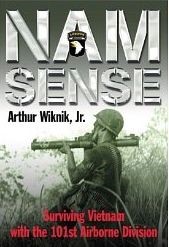 Nam Sense: Surviving Vietnam with the 101st Airborne Division
Nam Sense: Surviving Vietnam with the 101st Airborne Division
By Arthur Wiknik, Jr.![]() Nam Sense – Grunts intuition, May 9, 2011
Nam Sense – Grunts intuition, May 9, 2011
Arthur Wiknik’s story touched upon many of the memories I have about my own tour as a grunt in Vietnam. I do recall that after Basic Training and AIT, many of us sought out additional training in order to delay our deployment to Vietnam; Arthur coins it best, “…maybe the war will be over after all this training and I won’t have to go.” Many of us draftees signed up for Leadership Preparation Course, NCO (Shake ‘n Bake) training, and jump school to shorten the potential time left in the military. However, the war hadn’t ended and our destiny was fulfilled.
Nam Sense takes the reader through many adventures during Arthur’s year long tour with the 101st Airborne. Hamburger Hill, A Shau Valley, Firebase Riptide, et al, were very dangerous places, grunts counted on the seasoned veterans to get them through patrols; most were only Spec 4’s and PFC’s, but they knew their stuff. When Cherry Officers arrived, not all were like Aurthur’s leader, who insisted on leading them all to glory to make a name for himself and catapult his career. Nam Sense or “Intuition” saved many lives during the war – so did common sense. When officers chose to ignore this wisdom, troops suffered the consequences, some were killed. In his story, Arthur continues to be punished because of his continued criticism of the new Lieutenant, who does not want to pay attention to “Nam Sense” and instead pushes his men for his individual glory. Fragging is also touched upon and it is easy to see why somebody would want to kill their superior. During my tour,I had similar experiences with Cherry Second Lieutenants; one was seriously wounded after a month and the other “saw the light” after a few days and became more of a team member. However, most officers I served with respected the grunts and listened to their opinions.
As a Cherry NCO arriving in Vietnam, Arthur knew better than to push his rank and worked hard to be accepted by his fellow soldiers. Part of his strategy was to get businesses in the U.S. to send samples of most anything edible sent to Vietnam to share with his men. They also learned to respect him because of his views and persistence in standing up for the men.
Arthur does have a knack for “ghosting”, which he explains in the book. The time quickly adds up and reduces the amount of time he had to spend in the bush on patrol. Mr. Wiknik does have a sense of humor and I found myself laughing out loud on many occasions. Nam Sense is worth reading and offers the reader an opportunity to witness the insane things that occur in war.
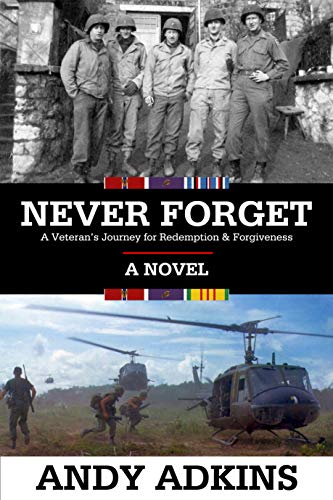 Never Forget
Never Forget
By Andy Adkins![]() A great Story
A great Story
Alzheimer’s, Dementia, and PTSD are all discussed in this story. The story begins with a phone call informing Tom that his estranged father of 25 yrs. , Ed, was in a nursing home suffering from Dementia and wanted to see him before his mind is gone.
Tom’s mother died while he was serving in Vietnam, and then when returning, he was shunned by his WWII father. Having enough, he walked out on him and hadn’t heard or seen him since. Tom’s wife had also died years earlier, so he raised his son, Chris, by himself.
When he arrives at the home, Tom is taken back on how cordial his father was and how much he was liked by everyone there. Taking Chris along to visit his grandfather for the first time became a catalyst that helped both Tom and his father get over the hate’ they carried. Chris interviewed his grandfather about the war for a school project and Tom found many similarities to his own time when serving in Vietnam. Tom is assisted by the home psychiatrist, a preacher, and his son during these visits, which brings the family closer together.
During these visits, Tom opens up and tells his son and father about his war experiences for the first time. A preacher at the nursing home, also a Vietnam Vet, convinces him to join their monthly rap sessions to discuss the war. Initially quiet, Tom soon became more comfortable and later opened up to the group.
The story is very emotional, well-written, and flowed quite well.
I found no typos or other errors. Well done, Andy!
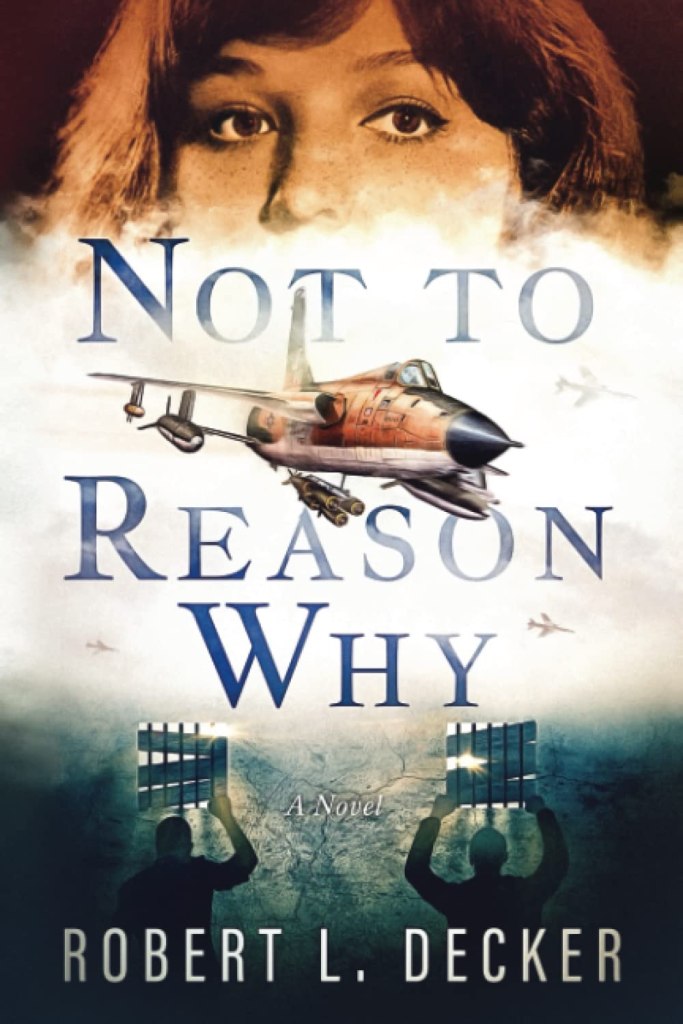
Not To Reason Why
By Robert Decker A Captivating Read
A Captivating Read
NOT TO REASON WHY by Robert Decker is a story of love, hope, and faith during the Vietnam War. Three couples come together during Air force fighter training for the new Thud aircraft. Normally relationships that developed during this training ended when the pilot is transferred. In this case, Zack falls in love with Ruth and marries her upon the completion of his training. All three pilots, who are now married, are sent to Vietnam to fight in the air war and bombing of Hanoi. Two of them return after completing 100 missions, Zack is shot down and listed as MIA.
The story then evolves around Zack’s internment at the Hanoi Hilton and other prisoner camps in North Vietnam. Readers learn more about the torture, lack of medical attention, and the suffering these pilots endured during Zeke’s captivity. Readers also see the personal side of the families back home and how they suffer and try to cope with Zack’s disappearance. The government shares little information and wants them to keep quiet about their husband’s captivity and not share information received from the government.
The story also touches upon the Kent State riots and student deaths (one of the trio is stationed there to teach ROTC after returning from Vietnam), and what led up to the confrontation. Ruth learns about the LEAGUE OF FAMILIES, and then joins their fight against the US government to get the word out about the POWs, their treatment, and to learn more about their missing husbands.
The story was captivating and kept my interest the entire time. It is long 600+ pages that flows well and are error-free. I’ve read other books by POWs and their plights. This one, however, deals more with the mental stress of captivity, isolation, and internal battles fought against the captors, and the hope and faith it generates at home. It is an exciting read and one I highly recommend.

No Where Man
By Stephen Piotrowski
I expected Better
Author, Stephen Piotrowski, poured his heart and soul into his memoir, No Where Man. In it, he shares with us what it was like in Vietnam during his last few weeks. I could relate to much of what he experienced during that time, especially his closeness with Top and the XO.
It was a different story after his homecoming. Nobody wanted to hear about his exploits during the war and it seemed like he had nothing in common anymore with those friends he considered close before getting drafted. Unfortunately, he was a motorhead and spent a lot of time with his GTO, driving drunk, racing, and wrecking it within the first few days of ownership. I was saddened that he had to spend much of his waking hours drinking beer at the bar or elsewhere.
The second half of the book seemed slower than the first half, with a lot of repetition. I was also discouraged to see so many typos and added/missing words, especially the names of towns and cities, which were spelled incorrectly. I do understand that it took the author forty years to write and publish this story, but a good editor should have been included as part of the process.
Mr. Piotrowski’s story is both happy and sad. The realism of coming home after the war can be shared by many, if not all, who fought in that senseless war. We all have a story to tell, and Steve’s story could have been any of ours. Do yourself a favor and get the story cleaned up. It’ll make a difference! Welcome Home!
 Nu
Nu
By James J. Flannery![]() WOW – Not what I expected, January 8, 2011
WOW – Not what I expected, January 8, 2011
Nu takes place during the Vietnam war, but it is not a war story. James Flannery is a school teacher seeking work, and the area around An Khe, in the central highlands, came highly recommended. He sought out a teacher, who was working with children in a very remote village in the mountains. After finding Nu, he is introduced to her methods of teaching, which are truly unique. He decides to join up with Nu, instead of working with the French Catholic school at the base of the mountain, and learns himself while teaching others.
Mr. Flannery lived and taught in this remote village, high in the mountains, for two years. People in the village have lived there for most of their lives and have never ventured too far away from home; in fact, travel was limited to how far a person could move by foot. These people were dirt-poor, and have never had electricity, refrigerators, televisions, plumbing, toilets, hot water or any other seemingly modern day conveniences. There were no newspapers and “news” was communicated verbally from person to person.
When reading Nu, I was blown away by the simplicity of the village and the strong values and cultures shared by the community. They were a very proud group where stature among the villagers is looked upon favorably. They will share the last bit of food with total strangers and will offer a roof over their head without expecting anything in return. Although the war is going on all around them, they don’t care and aren’t bothered by either side. They are left alone and survive, unmolested, on their own.
Readers will be treated to a whole new way of life as seen through the eyes of the author. James does an excellent job in showing us how life differs from that which we normally take for granted. It is a very difficult life living up in these mountains, but while reading Nu, I would have loved to be there with them. Finally, the Communist Viet Cong learn about this new American teacher and what he is doing. They set out to find him and kill him.
Nu gets five stars and is highly recommended. Buy this book and visit this brave new world! It will open your eyes!
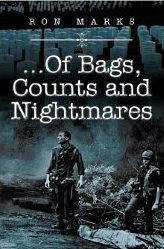 … Of Bags, Counts and Nightmares
… Of Bags, Counts and Nightmares
By Ron Marks![]() Survival Accompanies Misery!, March 13, 2014
Survival Accompanies Misery!, March 13, 2014
Tommie Bauer arrives in Vietnam during the middle of September, 1967 and is assigned to the 25th Infantry Division as an infantry soldier. The men of Charlie Company patrol through the jungles Northwest of Saigon near the Cambodian Border and seem to attract the enemy wherever they go. Helicopters get shot down, constant fire-fights seem to last forever, friends die, the men are alert most of the night – getting very little sleep, then move throughout the next day – cutting a path through thick jungle to locate the enemy. The men are exhausted physically, emotionally and mentally, their ranks – quickly depleting; they need to catch a break and recharge, but the enemy is on the move and they must be stopped. There is no time to rest.
The division soon creates a Recon Platoon – Tommie and some of his friends are recruited into this new outfit. They spend the first two weeks in training to learn tactics, stealth and other skill sets needed to operate in small groups, then chopper out the next morning on their first mission, These new missions require them to be invisible in their movements, then setting-up in small groups to “observe” possible enemy movements. They are not to engage, but must memorize every detail of what they witness about the enemy and then forward the information to division intelligence. Compared to what Tommie and his friends had experienced with Charlie Company, this new opportunity promises to be a great improvement. Unfortunately, the teams are ambushed immediately upon landing, choppers are shot down, friends are killed, and they are on the run – now outnumbered 5 – 1.
Firefights continue and it’s “deja vu” all over again. Only now, they operate in units of less than 10 men – team members continue to rotate in and out of the unit, replacements forego the two-week training program and join the units in the field within two days of arrival. The enemy is everywhere and supplies continue to move east toward Saigon. Rumor has it that the enemy is planning to stockpile supplies and then attack Saigon – forcing their surrender and ending the war. Little do they know that they are only two days away from the great Tet offensive of 1968.
There is a side-story taking place in which Tommie questions his relationship with two girls he’d left behind. When wounded, he engages a new relationship with his nurse – an Army Lieutenant, Rachel; they adore one another and become lovers. Her memory is the only thing keeping him sane.
“…Of Bags, Counts and Nightmares” is written in the first person, readers find themselves right there with Tommie – sharing his burdens and thoughts. It is also a wonderful representation of what soldiers experience in war. Perhaps, the experiences shared here are a little over the top and might qualify as a “worse case” experiment, but if this was not fiction, I would venture to say that Tommie suffers for the rest of his life – whether he has Rachel’s help or not. PTSD is a terrible disorder and does not go away! Learning, understanding and control are key in keeping this mental illness at bay!
Lastly, I just want to mention that there are several instances where the author uses “there” in place of “their”, “here” instead of “hear” and some other minor typos. No big deal though – it don’t mean nuthin’. Great book! Could not put it down to see what happens next to Tommie and his friends! Thank you Ron Marks!
 One Month, 20 Days, and a Wake Up
One Month, 20 Days, and a Wake Up
by Chuck Jackson![]() USAF Pararescue Jumper
USAF Pararescue Jumper
thoroughly enjoyed Chuck Jackson’s new story, “One Month, 20 Days, and a Wake-up – One man’s story of what it meant to be a PJ”. The Navy has their Seals, Army, Green Beret’s, and the Air Force,, Pararescue Jumpers (PJ). One thing to note is that they are all the best of the best and good at what they do.
In this story, readers follow the protagonist and his best friend as they go through basic training and then into Special Forces training to become PJ’s. The training is extremely difficult and those who graduate have a special skill – one that was greatly in need in the Vietnam War.
The friend is first to leave the country and later followed by the protagonist. Once there, he finds that the two of them will be separated during their tours.
The author’s recounting of the training and many rescue operations shared in the book makes readers thankful that people exist who are not daunted by the task at hand. In most instances, the PJ leaves the helicopter alone to seek out the missing pilots or crews of the downed aircraft. One story in particular left me breathless, where the jumper and missing pilot are left on the ground after enemy fire causes their transportation to vacate the area. To avoid spoiling the story, I will leave it there.
Other missions tell the story of rescues where those on the ground did not survive and the mission became one of recovery instead. Initially, I thought this book was about the author writing about his own experiences. He did let me know that the story is a work of fiction and the accounts are those based on the recounting from a close friend. Either way, I’ve a great respect for these men and their special skills. As a result, I feel comfortable knowing that soldiers like those portrayed in this story are keeping me safe.
Highly recommended for those wanting to learn more about what these special people have to go through to earn the burgundy beret and flash…and then, marvel at what it takes to stand between us citizens and those who want to harm us. Great job Mr. Jackson!
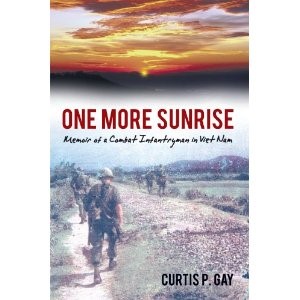 One More Sunrise:
One More Sunrise:
by Curtis P. Gay![]() A Compelling Read
A Compelling Read
“One More Sunrise: Memoir of a Combat Soldier” tells the story of Curtis Gay, an infantryman, assigned to the 25th Division, who operated in the jungles of the Central Highlands near Pleiku and the Cambodian border. The year was 1967, the war gaining momentum – more soldiers added to the fray to locate and destroy the enemy.
All memoirs that I’ve read share a common point – the unbearable heat and unique smells of Vietnam. Of all the troops sent to Vietnam, only 10% (infantry soldiers) scoured the jungles in search of the allusive enemy, sometimes, stumbling into booby traps, fortified bunker complexes and ambushes, causing death on both sides. The other 90% supported their ground efforts. This is not to say that only the infantry soldiers were at risk of dying during the war, helicopter pilots and crews took great risks in pulling out the wounded, resupplying troops ammunition during the heat of battle and doing anything else possible to keep their brothers on the ground safe – oftentimes, giving up their lives to do so. Everyone else was in a supported mode and stationed in small fire bases and large division base camps, although, they were subjected to enemy artillery, mortar and rocket barrages, sappers, ground assaults and road ambushes.
Mr. Gay paints a vivid picture of the life of an infantryman during the Vietnam War and touches upon it all. The never-ending patrols, the monsoon, mountains, ravines, bridge security, villages, insects, lack of food and water, running out of ammunition during a firefight, seeing death – both of friends and foe, lack of sleep, “Dear John” letters, booby traps, carving out a depression to sleep in, malaria, lack of hygiene for six weeks at a time, hospitals and coming to the rear areas for R&R.
The book is easy to read and flows well – I read it during a single afternoon. My only complaint is that it is too short. Probably the most poignant section of the book is when Sgt. Gay returns home after recuperating from a bullet wound to his chest. His transportation is on a C-130 transport plane – the sole living passenger in a cargo hold filled with flag draped coffins. His arrival in the U.S. is met with touting protesters and flying spit, he is confused and wonders what he’d done to deserve this…an older cab driver comes to his rescue. When Curtis finally arrives home, he finds himself alone and nobody around to talk to who would understand what he’d been through.
I am also a former Vietnam infantry vet and could fully relate to Curtis’ story…been there…done that! His story is educational and includes a glossary of terms to help readers who are new to the Vietnam experience. The title of the book is spot on…we all lived, fought and prayed to see “One More Sunrise” and finally got to go home after witnessing it 365 times.
Great job Sgt. Gay! Welcome Home Brother!
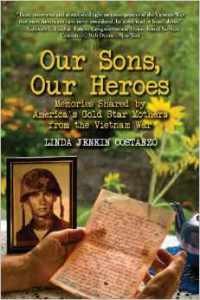 Our Sons, Our Heroes: Memories Shared by America’s Gold Star Mothers from the Vietnam War
Our Sons, Our Heroes: Memories Shared by America’s Gold Star Mothers from the Vietnam War
By: Linda Jenkin Costanzo![]() Ten Stars, March 28, 2014
Ten Stars, March 28, 2014
If allowed, I would rate “Our Sons, Our Heroes” by Linda Jenkin Costanzo TEN STARS! The author has compiled an impressive collection of stories which address one side of war seldom heard of – the impact of losing a son to war. Ms. Costanzo spent years seeking out and speaking with America’s Gold Star Mothers from the Vietnam War. In her story, she shares the memories of 16 mothers who lost sons in Vietnam, rekindling emotions, that for some, were buried almost forty years.
Every chapter is dedicated to a specific soldier – his military picture is the first thing a reader sees. It stays with you as you read about the mother’s fond memories of her child. In a few short pages, we get to know each one of these boys; their loves, hates, personality, sense of responsibility and clever things they did while growing up. All these mothers possess special boxes, filled with pictures, awards, letters and other memorabilia which honor this long, lost child; a few also share “special” letters in part or in whole to illustrate the special love between a mother and her son. An author, Thich Nhat Hanh, quoted the following: “You listen deeply for only one purpose – to allow the other person to empty his or her heart. This is already an act of reliving suffering. To stop any suffering, no matter how small, is a great action of peace.” It is very clear from the words within this book that Linda did just that.
There are some common threads between these stories; communication between the family and government is difficult, dealing with abusive protesters and hecklers, no help readily available to assist with emotional / mental issues, and finally, the difficulty in achieving closure when the casket arrives and is marked, “Remain sealed – military property – do not open”.
Most families struggled because the government did not provide an explanation or detail as to how their loved one perished. If they are lucky, one of the surviving soldiers from his unit might contact them to answer their many questions. However, this rarely happens because the soldiers are struggling themselves, trying to cope with terror filled nightmares of war and survivors guilt (surviving when their friends died). Some of these warriors do finally come forward, but it takes them fifteen years. I was surprised by the fact that protesters disrespected the families in their time of sorrow, spitting and heckling that their sons deserved to die in the war. I had thought it was only us soldiers that suffered through that humiliation. In the sixties, counseling wasn’t available to help get the families through the periods of grief and denial, prompting the families to get through it on their own. Parents were not allowed to open sealed caskets and see for themselves that the body within is indeed their son. This order is strictly enforced with a penalty of imprisonment if it is violated.
The Gold Star Mother’s Organization has been around since 1928, yet, very few know of its existence and benefits at the time their sons were killed. Those lucky enough to join found overwhelming support which helped move them and their family forward. In fact, many continue to support our veterans even today by volunteering in the VA hospitals and looking to help other mothers.
This book pulls at your heartstrings – making you cry in places. I am humbled to read about these ordinary women who are seldom recognized as they face adversity with extraordinary strength and character. Please listen to their story and remember that women continue to suffer the same fate today – as soldiers continue to die in war. I highly recommend it! Thank you Ms. Costanzo for writing this book and allowing me to share in this special story of love, gratitude and faith.
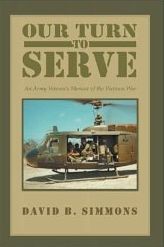 Our Turn to Serve : An Army Veteran’s Memoir of the Vietnam War
Our Turn to Serve : An Army Veteran’s Memoir of the Vietnam War
By David B. Simmons![]() A story of duty and service, September 25, 2011
A story of duty and service, September 25, 2011
Our Turn to Serve: An Army Veteran’s Memoir of the Vietnam War is a first person narrative which chronicles the author’s “old” experiences in college, through the military and into his post service years. Although this memoir is short, the author has succeeded in presenting an interesting and entertaining story that encompasses those significant memories that will never be forgotten. The author has stated in this tome that when two people standing side by side witness the same event, their accounts will be strikingly different. Our Turn to Serve is about his main accomplishments during the late sixties – those he can still remember – a memoir to share primarily with his family and anybody else interested in the Vietnam experience.
As a Vietnam Veteran myself, when reading about Dave’s experiences in both basic training and AIT, I found myself smiling, remembering similar experiences myself. It’s almost like everyone responsible for the training of these new recruits were following an identical script over the years.
Dave makes a comment when first stepping out of the plane after arriving in Vietnam. The identical comment is made by most all the authors of Vietnam War books: “…when I stepped into the midday sun, I could not believe the immediate impact of the oppressive high heat and humidity…never before have I experienced anything like my welcome to Vietnam.” Dave was assigned to the infamous 7th Cavalry, First Cavalry Division – General Custer’s outfit during the Battle of the Little Big Horn and the same unit depicted in the movie, “We were Soldiers once.”
As a former infantry soldier myself, I could relate to many of the author’s shared experiences and hardships. The author also focuses upon the strong bond and “brotherhood” that develops between soldiers when serving together. To this day, he continues to feel guilty after losing a close friend. The author had to leave the bush for an emergency dental appointment. He’d only been gone for a day, but during his absence, his unit came in contact with the enemy and suffered casualties; one of them was his friend. Would it have made any difference if he had stayed behind on that very day? Could he personally have prevented his death? There are many more soldiers today carrying the same burden forty years later.
Dave also shares many of the events during his five day R&R to Hong Kong. In one situation, he ended up having to purchase several “Hong Kong Tea’s”, which is really watered down coke in a shot glass. This formality seemed to be common place throughout Asia where the “ladies of the night” always have to drink five of these to loosen up – mama-son always finds a way to get that extra $20 from GI’s – whether they accept her offer or not.
Finally surviving his year-long tour, Dave returned home and quickly changed into civilian clothes after meeting his family at the airport. He wasn’t ashamed of his uniform, but it appears that the respect he was anticipating upon his arrival home was replaced by disapproval.
Our Turn to Serve is also a story of duty and service! The most important lesson learned by the author when returning from Vietnam: “you realize how fragile and precious life really is when you’ve seen so much death and mayhem around you.” Many war veterans write about action they saw, but there is a lot more to remember than just action. There were friends, frustrations, mistakes, the occasional laughs, the sadness, losses and fear. This is what Dave focuses on in his story.
Highly recommended for anyone seeking a short story to learn more about what these young men had to endure for twelve months. David’s descriptions are right on!
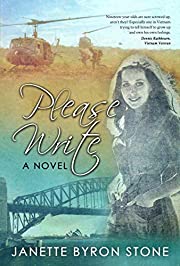
Please Write: A Novel
By Janette Byron Stone![]() A great read
A great read
I thoroughly enjoyed Please Write by Janette Byron Stone, which tells the story of Catherine’s coming of age in Australia during the Vietnam War. Raised as a strict Catholic in a sheltered home just outside of Sydney, Catherine gets her first real job at 17 – working in a record store and later as a waitress in a coffee shop in Kings Cross. Australia had recently opened its doors for American soldiers serving in the Vietnam War for R&R and most come to seedy Kings Cross.
It is here that Catherine meets the young American soldiers who long for a female presence and companion who makes them feel at home. Many of those she met continued to correspond with her after returning to the war and back to the states. The author includes many of those actual letters in her story.
When she turns 19, her life changes after a tragic event within the family. This is not a Vietnam War novel, however, if you were a soldier who visited Australia on R&R, it will bring back memories of those days long passed. The author also includes a glossary of Australian terms to English at the end – I recommend you look it over first before reading the story. Highly recommended!

Point: Wilderness War in Vietnam and Cambodia – A Memoir
By Jamie Thompson![]() A Valued Read
A Valued Read
I enjoyed reading “Point: Wilderness War in Vietnam and Cambodia – A Memoir by Jamie Thompson. In it, the author takes us through his US Army basic and AIT training and then, Shake and Bake School where upon completion, graduates are promoted to E-5 Sergeants. He knew that his destiny as a new sergeant was to immediately take him to Vietnam, where the life expectancy of “instant sergeants” was extremely low.
Instant NCO’s and Second Lieutenants weren’t too popular in many infantry units, and those who’ve been in country for months didn’t like taking orders from these cherry soldiers; both lacked experience in the bush and therefore, couldn’t be trusted to make the right decisions – especially those lifers who were trying to make a name for themselves. In Jamie’s case, he chose to prudently accept the advice of his predecessor and learn from the “old-timers” then leading by example – doing himself what everyone else in his squad did. This included guard duty, burning shit, and walking point. It didn’t take him long to gain the trust of his squad members and he eventually, became a great teacher.
The war is winding down and skirmishes with the enemy were far and few in between. If you are looking for a book that is filled with firefights and battles – this is not for you. Instead, the author relates his experiences as a grunt in the boonies, who endures endless patrols through the bug-infested jungles of Vietnam, until he is wounded during the Cambodian invasion. Afterward, he shows us how time was spent in firebases, and on top of The White Virgin Mountain (Nui Ba Ra) for the next several weeks. During this time, he and others find ingenious ways to pass the time, survive a flood during monsoon season in a new camp, his “against regulation” trip to Saigon for an overnight, and his efforts to help reduce the rat population in those bunkers they cohabitate nightly.
The final chapters tell of Sgt. Thompson’s return to civilian life after Vietnam and current updates of many of the characters in his story. He also includes a glossary of terms at the end of the book to familiarize readers with many of the military acronyms used within.
Thank you for your service and sacrifice, Sgt. Thompson, and welcome home! Great job on your memoir!
 Poisoned Jungle
Poisoned Jungle
by James Ballard A Great Read
A Great Read
A Medic holds a special place in the hearts and minds of fellow soldiers. He is respectfully called “Doc” and thought to fix any ailment that arises, even when MD’s don’t have an answer. In Poisoned Jungle, Andy, a medic, suffers from guilt every time one of his fellow soldiers or an innocent civilian dies in his arms – guilty that he was unable to work magic and keep them alive.
When Andy finished his tour, he felt as if he were abandoning his fellow soldiers – this seems to be a true feeling experienced by most soldiers when leaving Vietnam as soldiers came and went as individuals and not as a unit. I know it did for me. He is later devastated when learning that three of his fellow soldiers died in an ambush soon after leaving, thereby, creating further guilt in thinking that if he were there, he might have been able to save them.
In an attempt to move on beyond his guilt, bad dreams, and feeling of survivor’s guilt, Andy turns to alcohol, goes AWOL and ends up in jail. He is continuously asked to tell his thoughts, but unable to explain what he couldn’t make sense of himself.
Over the next forty years, he only shares his thoughts with a select group of people and begins to put his experience in Vietnam behind him. PTSD is still not a recognized mental illness and the VA doesn’t want to treat soldiers suffering from this malady. Agent Orange is touched upon and Andy loses close friends to illness caused by the defoliant. In fact, Andy and his wife adopt as he fears having a child born with deformities caused by AO.
The author does a great job of moving the story along and giving readers a first-hand glimpse of PTSD and how war impacts soldiers. I highly recommend Poisoned Jungle to anyone who wonders why soldiers change and are not the same upon their return home. This story will help you understand!
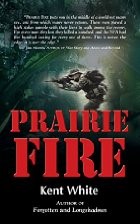 Prairie Fire
Prairie Fire
by Kent White![]() Educational and Engaging
Educational and Engaging
I thoroughly enjoyed reading “Prairie Fire” by Kent White, finding it both educational and engaging. Unbeknownst to all but the U.S. government and Special Forces soldiers in MACVSOG, U.S. military “Top Secret” forays were conducted into Laos and Cambodia throughout the Vietnam war. Now that the statute of limitations has expired, information about these Top Secret missions are available to the public; SF soldiers are now able to share their stories.
The author categorized his story as fiction, but is surely written based upon his personal experiences in these missions. He admits to taking some liberties within the tome for the sake of the story, but it was difficult for me to determine the difference between fact and fiction. Nevertheless, this is an exciting, edge of your seat read, as the author takes readers along on some of these forays into Laos. Each recon team has 2 – 3 Americans and several indigenous mercenaries from China, Laos, Cambodia or Vietnam, who stealthily move through the jungles to verify intelligence reports for the higher ups. These teams are on their own during these 5-day missions, except for air support, which would take up to an hour to arrive. Although their main task is to observe, sometimes the teams’ existence is compromised, and they need to fight and evade until help arrives. This gets hairy, especially, when the enemy soldiers use “experienced trackers” to hunt them down. The time line of this story takes place during the final months of 1967, a period when North Vietnam was preparing for the famed “TET” offensive at the end of January, 1968. So the jungles were packed with traveling battalion sized units of soldiers, trucking convoys of supplies, rest areas and training schools. Their most perilous mission will be to locate a suspected POW camp with live Americans while all this is going on – those teams have a feeling of dread like no other mission before.
Although many soldiers died during these secret missions – complete teams simply vanished without a trace, their efforts significantly impacted how the war was fought in South Vietnam by eliminating supplies, weapons, armaments and enemy soldiers who never made it to the battlefields. Great job Mr. White! Already purchased your next book and will start it immediately after posting this review. Thank you for your service and welcome home!

Prey for the Sniper: A Vietnam War Novel
By David Allin
![]() t’s OK, but…
t’s OK, but…
For some reason, Prey for the Sniper, took me a little while to get into. In this tale, there are three separate story lines that the author weaves together and finally clash together at the end. A coke girl and mama san sandwich lady by day and VC at night, Tranh, a teenage girl, has a special mission that could end the war. She is gung ho until her sniper ally kills one of the American soldiers she’d befriended and pined for and now wants her revenge, but not against the Americans.
Their mission is to take place on the side of Nui Ba Den (Black Virgin Mountain) during the Christmas holidays. They arrived late and missed their initial opportunity…one final chance remaining. The mama san sniper is good at her job and a great nemesis for the American sniper team who is tracking her, but only one of them will succeed.
David also brings in characters from his earlier books – all missions of this mechanized unit for the 25th Infantry Division. As a former Wolfhound grunt, myself, I enjoy reading about some of the same areas I’d patrolled through and in learning more about how mechanized units operate and of the things they did differently. Mr. Allin paints a great scene and makes me feel like I’m right there with the troops.
This story seems to drag some as compared to his others and contains more typos. However, none of it interrupted the flow and I enjoyed the ending. Thank you, Mr. Allin, well done!
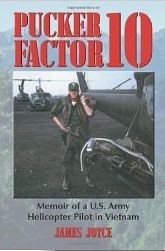 Pucker Factor 10: Memoir of A U.S. Army Helicopter Pilot in Vietnam
Pucker Factor 10: Memoir of A U.S. Army Helicopter Pilot in Vietnam
By James Joyce![]() Pucker Factor ten-thousand, January 5, 2011
Pucker Factor ten-thousand, January 5, 2011
As a Vietnam Infantry veteran, I have always held the chopper pilots in the highest regard for always being there when needed. Without them, we would not have survived. I had jumped from choppers into hot LZ’s, finding the deepest depression or fattest tree for protection before returning fire – pucker factor ten-thousand! These pilots were relentless and continued to ferry and land reinforcements with not much protection for themselves. They flew their machines through steady streams of gunfire, and yet, they continued as if they were invincible. Dust off’s, ash and trash runs, troop deployments and evacuations and over-head support were all part of their everyday job.
Mr Joyce does a wonderful job with this well-told story and offers the reader an in-depth look at the everyday life of these flying warriors, which isn’t, by the way, a nine to five job. The book follows Mr. Joyce from the first day he volunteers to fly planes in college, through his fixed wing flight training and later reassignment to a helicopter squadron, and then during his tour in Vietnam. The author also has a fantastic sense of humor that sometimes catches you off-guard and will make you laugh out loud. After reading Pucker Factor 10, I have bumped up these pilots a couple of notches on my high esteem list. I also have a much better understanding of what these sky warriors had to endure in order to survive…sadly, many did not!
Five stars and highly recommended!
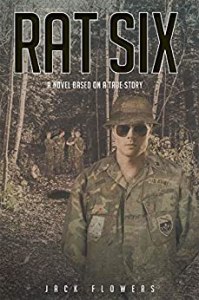
Rat Six
by Jack Flowers![]() An Engaging Read
An Engaging Read
Jack flowers’ memoir provides readers with a snapshot of his life in the late sixties and early 1970’s. He lived, went to school, and taught English in Denmark for a short period of time during which he fell in love with both the culture and a certain female. When he returned to the States and dropped out of college, he soon found himself drafted in the U.S. Army. After basic training, Cliff Price – his protagonist – decides to become an officer and completes OCS with orders to Vietnam. During his 30-day leave prior to reporting to California, Lt. Price returns to Denmark to visit acquaintances from the past, especially the girl he left behind.
When he arrives in Vietnam, he is surprisingly assigned to an Engineering battalion in the 1st Infantry Division. For the next few months, Lt. Price develops his group of engineers into a highly efficient team, who are proficient in mine clearing, demolitions, building bridges and bunkers, and tearing down jungles. He is soon recognized by higher-ups and is asked to volunteer for the open leader position in the division tunnel rat platoon, which is an “all-volunteer” outfit. His call sign would be “Rat Six”.
Upon his acceptance, he finds the unit to be highly efficient themselves and were lead by a sergeant nicknamed “Batman” – on his third tour and well-known throughout the division. Lt. Price and Batman soon learn to work together and his training begins. He also learns that the previous officers did not last too long in the position.
I was quite interested in their missions through the Iron Triangle and Michelon Rubber Plantation as those were the areas I worked in while assigned as a grunt with the 25th Division. The author has a knack for keeping up the suspense and holding readers to his every word. Every grunt I know felt that the tunnel rats were hugely courageous and didn’t consider themselves to be brave enough to go underground and flush out the enemy. The missions were harrowing and truly required a special breed os man.
I enjoyed the story and learned a lot about this special group of soldiers and what they did. Unfortunately, I did come across many typos in the story and was disappointed that the author didn’t tell us what happened to Lt. Price’s two women in the story. Highly recommended for those interested in learning more about this special breed of men and what they did during the war.
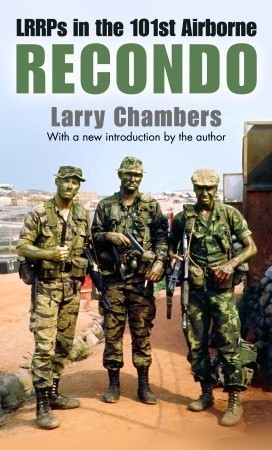 Recondo: LRRPs in the 101st Airborne Kindle Edition
Recondo: LRRPs in the 101st Airborne Kindle Edition
by Larry Chambers (Author)![]() Great Read
Great Read
“Recondo” is a captivating and engaging story about an infantry soldier who goes to Vietnam and volunteers for the LRRPs in the 101st Airborne and later gets accepted into the prestigious Recondo training program. The training is rigorous, demanding, and sometime dangerous. The author doesn’t go into much detail about the training modules but paints an overview for readers to get a feel for what it was like. The 3rd week (final week) entailed small teams to go into the Ashau Valley to gather intelligence and to locate an NVA Regimental headquarters. A program cadre member accompanies each team – failure for individuals to demonstrate skills from their first two weeks of training will result in expulsion from the class.
Chambers and his team climb mountains and near the end of the week find themselves in a situation that was almost unbelievable; this hill was later immortalized as Hamburger HIll by the 101st grunts after their 10-day battle to take the mountaintop. As a former 101st grunt myself, I could relate to much of what the author wrote. I was familiar with the mentioned firebases and also patrolled through the Ashau Valley. We also learned that holding blasting caps during a thunder storm could be hazardous to our health, and especially, if they were already installed in grenades, claymore mines, C4 or carried loose in somebody’s pocket – my unit experienced that same thing that Chambers LRRPs did during a storm, but without the same consequences. I also enjoyed the author’s wit and sense of humor; many of the comments he made during the story made me laugh out loud.
“Recondo” flowed nicely and kept my interest from beginning to end. It would have been an added bonus if the author might have touched upon his R&R to Australia…showing what these soldiers experienced and why the trip was so important to them. I thoroughly enjoyed this story and recommend it to anyone interested in learning more about these small LRRP teams – their missions and training to survive. Great job, Mr. Chambers. Thank you for your service and sacrifice. Welcome home, bro!
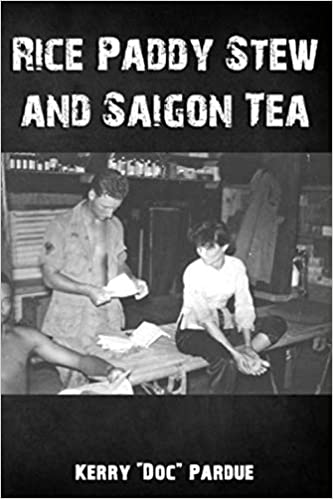 RICE PADDY STEW AND SAIGON TEA
RICE PADDY STEW AND SAIGON TEA
by Kerry (Doc) Pardue![]() A Profound Read
A Profound Read
You don’t have to enjoy poetry to enjoy this book. RICE PADDY STEW AND SAIGON TEA is a mix of prose and poetry about life, love, anger, hope, forgiveness, and the future. Some poems made me smile and laugh out loud, while others saddened me and caused tears to form.
The poems speak about the author’s life before, during, and after his service in Vietnam. Half of the book tells the story in more detail in conventional prose, and much of what is written reflects back to some of his earlier poems.
PTSD can be crippling. The author dedicated a chapter about this horrible disorder and how it affected him. He also shares warning signs and encourages veterans to seek help from the VA instead of trying to take it on alone. He cites his wife of 53 years to be his strongest supporter who has helped him through these troubled times.
Kerry (Doc) Purdue located some of those he served with in Vietnam and got together with those medics and doctors; each has a short biography included at the end of the book.
I’m not a fan of poetry but was amazed at how so much can be said in so few words. These “short” stories described what the author experienced during his life, and offered him an opportunity to express his inner feelings. It has been a rough and challenging life, and now he is finally able to have some peace. Highly recommended!
 River Rats
River Rats
By Ralph Christopher![]() Enlightening Read, January 16, 2013
Enlightening Read, January 16, 2013
Reading “River Rats” by Ralph Christopher was an educational experience for me. I am also a Combat Vietnam Army Veteran and author of a book relating my experiences as an Infantry Grunt with the 25th Division. My personal knowledge of the Brown Water Navy is limited, at best, and I am unfamiliar with their equipment, tactics, and mode of operations. Thankfully, Ralph’s explanations, pictures and story helped me to better understand how the war was fought in the Delta.
I was pleased upon recognizing many of the landmarks Ralph mentions in “River Rats” as they are the same areas my unit operated in. Although Ralph was already home by the time I had arrived in country, those shared areas were still very dangerous and very active with enemy soldiers and incoming supplies during my tour.
I’ve heard about the bases built upon pontoons in the middle of the river, but had no idea of its size, on-board facilities, and capabilities to support these fighting men. “River Rats” is mostly told in a first-person, but portions of it come across as an “after action report”. Not saying this is bad, but sometimes there appears to be too much detailed information (Navy speak) – more than a lay person can absorb while reading. I was especially intrigued with the smaller boats and four-men crews that went out on night ambushes – pulling up to the riverbank and beaching their craft – then watching for enemy movement. The reaction of boat crews during an enemy ambush from land is also something to behold…making strafing runs up and down the river and eventually beaching the craft immediately to the front of the enemy – I think there’s a saying about hanging brass ornaments and these boat crews. There is just so much to learn from “River Rats” that I must recommend it to anyone wanting to learn about the Brown Water Navy and the heroes of the Vietnam Delta.
There is only one negative that prevented me from rating this book five stars and that is misspelled words. Most all of them would pass a spelling scan, but they are used incorrectly. As examples: passed used instead of past and set instead of sat are just a couple of examples that come to mind. Otherwise, when looking past them, it was a great read! Thank you Ralph!
 Rendezvous
Rendezvous
by Nelson DeMille![]() t’s OK, but…
t’s OK, but…
The premise of the story was interesting enough, however, many of the events during this LRRP patrol would never have taken place. For instance, LRRP troops communicate with hand signals and members would never ask for a roll call (twice) or call out to other team members during a patrol, especially when surrounded by the enemy in Laos. Ten team members also seems extreme during a LRRP outing – they usually travel with five members. I’m thinking that Mr. DeMille called upon his past experience as an officer of an infantry unit when he was in Vietnam – when the actions described would have sufficed.
The characters in this short story were only names without any back story to any of them, so when killed, it’s only another name removed from the list of team members and no emotions.. It also ends abruptly, I expected it to continue for a bit to let readers know how successful the body recovery mission was.
f you have a spare hour, then Rendezvous is still worth reading…readers can follow the ten member LRRP team through the jungles of Laos and see how they fare against a very good female sniper, who just wants to have fun.
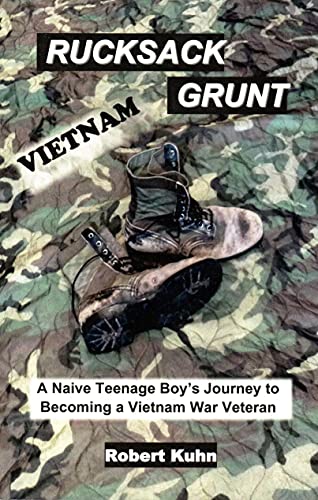 Rucksack Grunt: A Vietnam Veterans Memoir
Rucksack Grunt: A Vietnam Veterans Memoir
By Robert Kuhn![]() A Short Memoir
A Short Memoir
RUCKSACK GRUNT: A VIETNAM VETS MEMOIR is a short three-hour read that summarizes the author’s life from high school graduation to his homecoming after serving in the Vietnam War.
Robert volunteers for the draft with hopes of using the GI Bill to get an education and a decent job. He joins on the premise of becoming an MP and then joining the Police Force after his service commitment. As is a norm once in the military, Robert finds out that he doesn’t qualify to become an MP because he is not yet 19 years old. This results in his transfer to the infantry.
The author summarizes his basic and AIT training, highlighting some of those memories that stand out. When he arrives in Vietnam, he shares many of his firsts with readers: the heat, smell, rain, denseness of the jungle, humping, sleeping on the jungle floor, the insects and animals, guard duty, et all.
As the author specified in his blurb, this is not a shoot-em-up, blood-and-guts story. Instead, he dwells on the hardships of the individual soldier and what he had to overcome during his tour.
Rucksack Grunt takes place near the end of the war and his unit eventually pulls out of the country prior to him serving his full one-year tour. Those with 10 months or more in-country went home, and those with less were reassigned to another unit. The author lucks out and qualifies for not only leaving Vietnam but also getting an early-out from the service. Thus, becoming a civilian again upon leaving the war.
I’d highly recommend Rucksack Grunt for a quick overview of what serving in Vietnam was like for those Warriors serving there. The author also includes dozens of personal photos that he uses to enhance his commentary. As he points out, there are thousands of stories about the war, and no two are the same. Rucksack Grunt is Robert Kuhn’s tale.
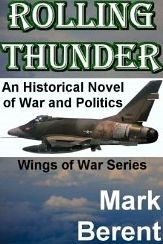 ROLLING THUNDER (Wings of War)
ROLLING THUNDER (Wings of War)
By Mark Berent![]() Exciting and Educational read, January 19, 2014
Exciting and Educational read, January 19, 2014
Mark Berent’s book, Rolling Thunder not only tells a war story, but educates readers who are not familiar with the terminology and routines of pilots during the Vietnam War. I learned a lot and thoroughly enjoyed this story in which the author follows the adventures of three strangers, soldiers who cross paths on several occasions during their tours and eventually become friends: An Air Force captain and fighter pilot, an Air Force administrative lieutenant and an Army Special Forces Major. Their lives become intertwined in the story – at one time, all three are fighting for their lives in the same battle against an overwhelming enemy, but in different roles. It is early in the war and the military is fighting with their hands tied behind their back, the White House (the president and aides / civilians) are calling the shots: picking targets, identifying others that are strictly off limits and choose not to consider or approving targets recommended by the military. After all, The United States Government is afraid of drawing China and Russia into the conflict, thereby, taking a rather conservative stance in the war, angering those who take on the missions, placing themselves in harms way.Each story line is filled with adventure and hold your breath suspense. The Lieutenant’s character surprises me the most. seemingly having all the ups and downs during his tour. He falls in love with a local girl, then one night on the streets of Saigon, she saves him from the clutches of the VC. He sees her again several weeks later, but only as a witness to her murder when the base perimeter is attacked and breached by the enemy. He has it in his blood to fly…he experiences terror in the cockpit…he becomes a hero!Court Bannister, fighter pilot, is the son of a famous movie star…he has much to prove to his peers in Vietnam who think he got to where he is because of his father’s influence. It doesn’t take long to prove his worth! However, on one of his first missions, Courts’ wing man is killed because of pilot error. The pilot’s father, a general at the Pentagon, and Courts current commanding officer both blame the Captain for his wing-man’s death. The father, eventually goes so far as to get Court transferred from his current job of flying support for infantry units in the Delta and III Corps to bombing runs in North Vietnam – the most contested airspace of the war, losing an average of five planes / pilots per week.
The Green Beret is a fighting machine and appears to return from the dead – twice during the story. Wolf is a skilled warrior, leading teams to find and rescue downed pilots before the enemy can take him prisoner. However, his tour ends before he is able to complete some unfinished business. The major is set-up by a double agent on his last mission…both survived and both seek revenge upon the other. I’m certain that all three stories will continue in Mr. Berent’s next book when the three military officers return to Vietnam for a second tour.
A most enjoyable read and highly recommended to all. Great job Mark! Welcome Home Brother!
 The Road to VietnamBy Robert F. Quinn
The Road to VietnamBy Robert F. Quinn![]() Short autobiography
Short autobiography
The author provides readers with a summary of his time as a Merchant Marine and then as an Army infantry soldier. He’d been to Vietnam twice – once in each of his jobs. He does well for himself after serving in the military and enjoying the rest of his career in the San Francisco Fire Dept. His time in Vietnam is only an overview with very little action, detail or dialog. His book is only sold in soft cover via his email: bravoQ77@gmail.com
Return to Top
END OF CATEGORY


